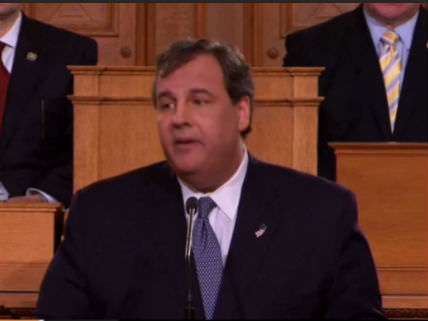Chris Christie Says Pot Legalization Is a Gateway to a Slippery Slope
New Jersey's governor thinks respecting individual freedom "sends the wrong message."

At the ribbon-cutting ceremony for a new drug treatment center yesterday, New Jersey Gov. Chris Christie explained why he opposes marijuana legalization:
This should not be permitted in our society. It sends the wrong message. Every bit of objective data tells us that it's a gateway drug to other drugs. And it is not an excuse in our society to say that alcohol is legal, so why not make marijuana legal?…Why not make heroin legal? Why not make cocaine legal? You know, their argument is a slippery slope.
Christie, a likely candidate for the Republican presidential nomination, perceives two marijuana gateways: one that leads from smoking pot to injecting heroin and one that leads from legalizing pot to legalizing heroin. He is probably wrong on both counts.
Although it's true that people who smoke pot are more likely to try other drugs, the nature of this association is a matter of dispute. "What is not at all clear," write Jonathan Caulkins and his co-authors in the 2012 book Marijuana Legalization: What Everyone Needs to Know, "is whether marijuana use causes subsequent use of other drugs or whether it is merely a signal indicating the presence of underlying social, psychological, or physiological risk factors—such as weak parental supervision, a taste for intoxication, or a willingness to take risks—for both early marijuana use and later hard drug use." The same pre-existing traits or circumstances that make people more likely to use marijuana may also make them more likely to use other drugs. As I explained in a recent Forbes post, there is considerable evidence in favor of that interpretation, despite Christie's claim that "every bit of objective data" supports the gateway theory.
Because of the gateway effect, Christie implies, we can expect to see increases in heroin and cocaine use in states that have legalized marijuana—increases not seen in other states. I very much doubt that will happen, and there is reason to believe marijuana legalization will have the opposite effect. In a 2011 article published by the journal Addiction, the social psychologist Robert MacCoun noted that a major argument for the Dutch government's policy of tolerating marijuana sales was that it would weaken the link between cannabis and other drugs. He cited evidence that cannabis consumers were less likely to use cocaine and amphetamines once they could buy marijuana in so-called coffee shops. "Although hardly conclusive," he wrote, "these data are consistent with the notion that the coffeeshop system might 'weaken the gateway.'"
What about Christie's argument that the logic supporting marijuana legalization leads inexorably to the legalization of other drugs? I hope he is right about that, but I doubt it, since public support for legalizing marijuana seems to be driven by widespread familiarity with pot, which is much more popular than other illegal drugs. Furthermore, the case for legalizing marijuana has relied heavily on its clear safety advantages over alcohol, and that argument will be harder (although by no means impossible) to make with respect to heroin and cocaine.
Still, Christie is right that if you oppose marijuana prohibition because the government has no business dictating to adults what substances they may introduce into their own bodies, you should oppose cocaine and heroin prohibition for the same reason. Christie thinks respecting individual autonomy in this area "sends the wrong message," as if the violence required by drug prohibition can be justified by its propaganda value. What message do drug warriors like Christie send when they use guns, handcuffs, and prison cells to impose their pharmacological tastes on others?



Show Comments (98)